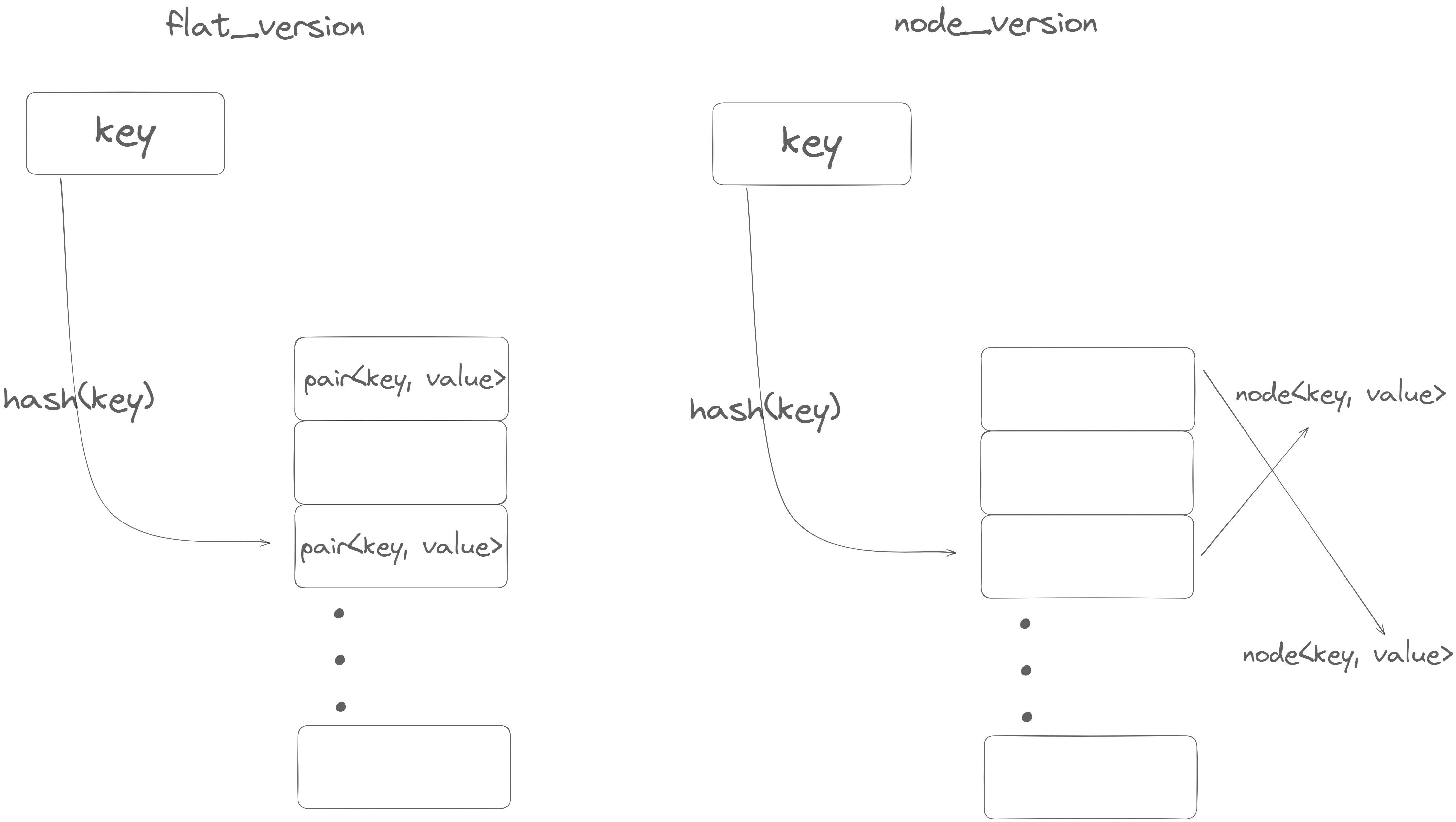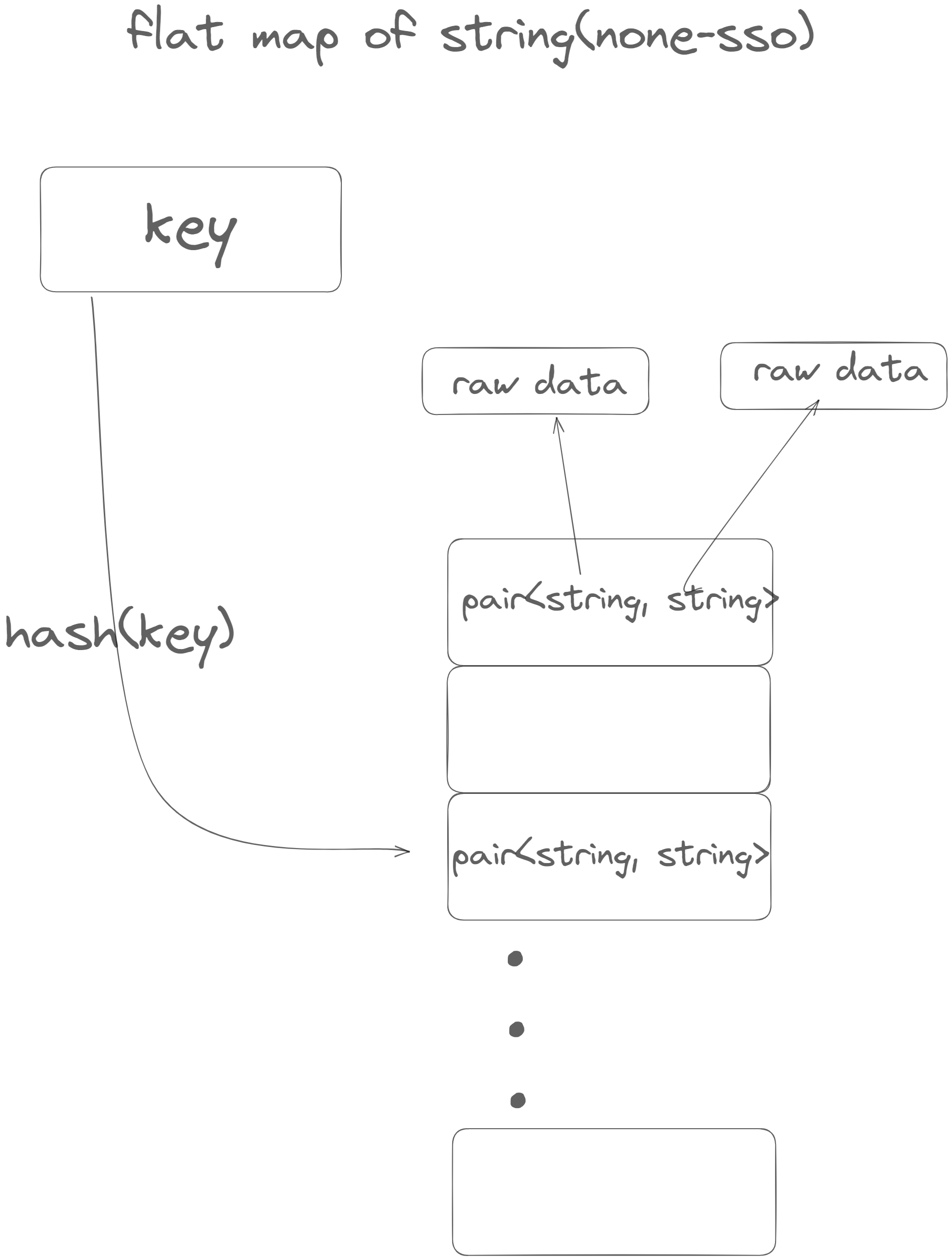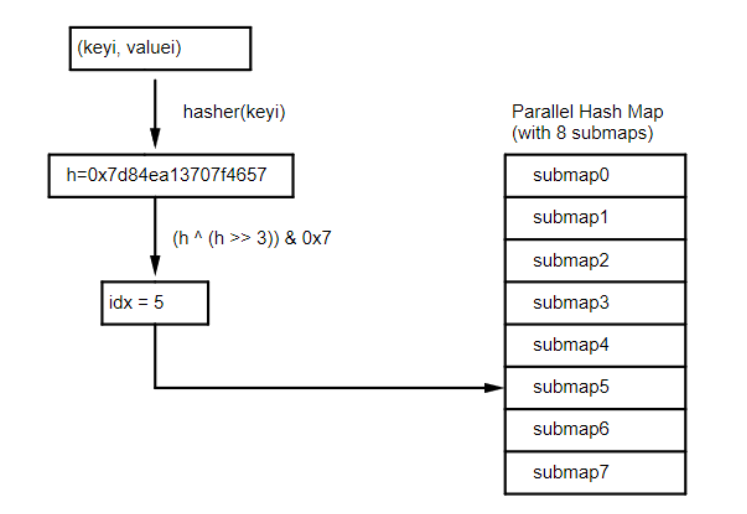众所周知,C++标准库的
unordered_map向来不是一个好的选择。开源市场上有非常多的高性能哈希表可供选择,phmap继承自absl-hashmap,有着非常好的插入、查找性能。在著名的Comprehensive C++ Hashmap Benchmarks 2022榜单中名列前茅。事实上,我比对了phmap::flat_hash_map与榜单中综合性能第一的ankerl::unordered_dense::map,我的benchmark中只有遍历哈希表时,flat_hash_map的性能低于unordered_dense::map,其余无论是插入还是随即查找,大部分情况下flat_hash_map的性能都更优。本文简单介绍了flat_hash_map相关情况,以及一些使用上的建议与坑点。
flat_hash_map 和 node_hash_map区别
phmap中有提供了两类哈希表,其内部布局示意图如下:

由上图(忽略了bucket的细节)可以看出,flat_hash_map的最大的优点在于
- node之间的内存是连续的(虽然可能中间存在空node),遍历的时候对cache更加友好
- 并且相比于
node_hash_map版少一次寻址过程(std::unordered_map的设计与node_hash_map)相同。
而 flat_*系列的缺点就是在 rehash的时候:
- 会引发原来的value失效(这里的失效指的是原来的那个对象所对应的内存失效,而不是value所包含的内容失效,例如,value是一个指针,那它的值——所指向的对象,不会受到影响)。举个例子:
flat_hash_map<int, Data> mp;
node_hash_map<int, Data> nodemp;
mp[0] = Data();
nodemp[0] = Data();
auto& mp0 = mp[0];
auto& nodemp0 = nodemp[0];
// tigger rehash
for (int i = 1; i <= 10; i ++) {
mp[i] = Data();
nodemp[i] = Data();
}
assert(std::addressof(mp[0]) != std::addressof(mp0));
assert(std::addressof(nodemp[0]) == std::addressof(nodemp0));
原因就是 flat_hash_map的内存布局导致的。而 node_hash_map或者 std::unordered_map就保证不会出现这种情况,因为当他们rehash的时候,只需要将bucket内的指针重新分配,指针的值还是指向原来的 node<key, value>.
- 由上述原因引发的性能问题: 当
node<pair, value>很大的时候,flat_hash_map每次 rehash 需要重新构造的开销大,而node_hash_map只需要重新构造相同数量的指针。并且遍历时也因为两个node之间相隔较大使得 cache locality 下降。
使用建议(单线程)
绝大多数情况下直接用 flat_hash_map:
int -> intint -> stringstring->intstring(sso) -> string(sso)string(none-sso)->string(none-sso)
少数情况用 node_hash_map:
key -> Large Data
这种情况强烈建议用 flat_hash_map<key, ptr<Large Data>>代替
有意思的一点是为什么经过实测 string(none-sso) -> string(none-sso)这种情况下仍然是 flat_hash_map更快一点,难道string(none-sso)不是Large Data吗?
事实上,string 虽然可能很大,但是其 raw data存在另外分配的一个空间(超过短字符串优化限定大小时),所以当rehash的时候,新生成的string只需要move由来的string就可以了。下图展示了其内存布局:

另外,如果提前知道需要插入的pair的数量(或者大致数量),特别是只作为一个look-up table使用时(一次性插入,只查询或更改已存在的key),那么使用提前 reverse是个明智的选择,这能有效提高哈希表的性能。一般需要reserve成需要插入数量的 两倍 而不是一倍 ,因为与vector这样的容器不同的是,为了防止过于频繁的碰撞,会在每个bucket还没满的时候就进行扩容
parallel_flat_hash_map
phmap库除了包含继承自 abseil的 {flat/node}_hash_{set/map}外,还有支持并发操作下的 parallel_*系列。以 parallel_flat_hash_map为例,其实现如下图:

一个 parallel_flat_hash_map有(默认 2^4 = )16 个 子flat_hash_map组成。这样做可以
- 更加细粒度的使用锁,从而减少锁之间的等待
- 一次rehash一个
submap,减小修改操作的开销
基本的使用方法也很简单,需要在模板参数上指定一个锁,一般使用(std::mutex或者std::shared_mutex,官方文档说shared_mutex性能更优,我个人的测试下mutex性能更优,但是相差不大)。其余的使用上与非parallel版本基本一致,以下是简单的例子:
// 前两个模板参数是key, value,最后两个模板参数是 N (2^N表示子map的数量, N默认为4), 和指定的锁
phmap::parallel_flat_hash_map<int, int,
phmap::priv::hash_default_hash<int>,
phmap::priv::hash_default_eq<int>,
phmap::priv::Allocator<std::pair<constint, int>>, 4, std::mutex>
para_mp;
para_mp[0] = 1;
para_mp.subcnt(); // return sub map count
经过测试,在插入和修改操作混合的情况下(随机插入1000000个数,非重复数字在600000以上),parallel_mp耗时 80ms 左右,而手动给 flat_hash_map 加锁耗时 250ms左右。
另外,既然 parallel_*是由多个子map形成,那个在特定条件下,我们甚至可以无需锁就能保证线程安全。
具体操作如下:
- 已知所有的需要插入的key
- 每个线程需要有一个线程idx标识,线程数量少于
子map数量 - 对于特定的key,得到hashval后将这个key的所有相关操作绑定到某个特定线程上进行。
这样就可以实现无锁并发
我们可以通过下面这个例子具体观察:
template <typename K, typename V>
using para_mp = parallel_flat_hash_map<K, V>;
const int n = 1e6;
auto const keys = random_vector<int>(1, n);
constexpr int64_t num_threads = 8;
auto thread_fn = [&num_threads](para_mp<int, int>& mp, vector<int> const& keys,
int thread_idx) {
size_t modulo = mp.subcnt() / num_threads;
for (int64_t i = 0; i <keys.size(); ++i) {
int key = keys[i];
size_t hashval = mp.hash(key);
size_t idx = mp.subidx(hashval);
if (idx / modulo ==
thread_idx) // if the submap is suitable for this thread
{
mp[key] = rng(); // insert random value
}
}
};
std::unique_ptr<std::thread> threads[num_threads];
for (int i = 0; i < num_threads; i++) {
threads[i].reset(
new std::thread(thread_fn, std::ref(mp), std::cref(keys), i));
}
timer.reset();
for (int64_t i =0; i < num_threads; ++i)
threads[i]->join();
上面的代码基本展示了无锁使用 parallel_*的过程,我们会将hashval按照 submap 进行区分,如果 idx = mp.subidx(hashval) 表示这个key对应的 submap。在上述代码中,一个线程对应两个 submap可以进行插入。
这种用法的局限性也很明显:线程数量需要是 submap 数量的倍数;一个线程一定要对应一个下标传入需要处理的函数;总之不是很好用…
(在多线程下只用map更加有效的方法或许是对于不同的key直接用不同的线程进行处理,且提前reserve防止rehash的时候迭代器失效)
benchmarks
以下操作的个数都为 1'000'000次,最后一列string->string 插入次数为 100'000次
vector作为baseline插入pair<K,V>进行比较
| benchmarks(insert) | insert ints | insert ints(reserve first) | insert string(sso)->ptr | insert int->LargeData | insert string(8)->string(4096) |
|---|---|---|---|---|---|
| std::vector | 17ms | 7ms | 33ms | 102ms | 153ms |
| std::unordered_map | 170ms | 72ms | 343ms | 249ms | 213ms |
| flat_hash_map | 47ms | 34ms | 90ms | 462ms | 182ms |
| node_hash_map | 152ms | 68ms | 182ms | 236ms | 183ms |
| benchmarks(read) | iterate ints | find int | iterate string | find string |
|---|---|---|---|---|
| std::vector | 0ms | * | 3ms | * |
| std::unordered_map | 20ms | 52ms | 55ms | 152ms |
| flat_hash_map | 3ms | 23ms | 8ms | 71ms |
| node_hash_map | 14ms | 38ms | 14ms | 108ms |
About parallel_flat_hash_map
| inserting 1000000 ints | 1-thread | 8-threads | 8-threads |
|---|---|---|---|
| flat_hash_map | 31ms | 23ms(no lock) | 214ms(mutex manually) |
| parallel_flat_hash_map | 35ms | * | 70ms(mutex/shared_mutex) |
一个小问题
在测试的时候发现,无论是 flat_hash_map还是 node_hash_map都没法插入 None-moveable的数据,但是 std::unordered_map可以。
structNonCopy {
NonCopy() = default;
NonCopy(NonCopyconst&) = delete;
NonCopy&operator=(NonCopyconst&) = delete;
NonCopy&operator=(NonCopy&& rhs) = default;
NonCopy(NonCopy&& rhs) = default;
};
structNonMove {
NonMove() = default;
NonMove(NonMoveconst&) = default;
NonMove&operator=(NonMoveconst&) = default;
NonMove(NonMove&&) = delete;
NonMove&operator=(NonMove&&) = delete;
};
template <K, V>
using fmp = flat_hash_map<K, V>;
template <K, V>
using nodemp = node_hash_map<K, V>;
TEST_CASE("hash_map") {
fmp<int, NonCopy> mp_nocp;
std::unordered_map<int, NonCopy> stdmp_nocp;
nodemp<int, NonCopy> nodemp_nocp;
fmp<int, tbs::NonMove> mp_nomv;
std::unordered_map<int, NonMove> stdmp_nomv;
nodemp<int, NonMove> nodemp_nomv;
constint n = 1e6;
for (int i =0; i < n; i++) {
stdmp_nocp[i] = std::move(NonCopy());
mp_nocp[i] = std::move(NonCopy());
node_nocp[i] = std::move(NonCopy());
}
for (int i =0; i < n; i++) {
stdmp_nomv.emplace(i, NonMove());
}
// the following code can't pass complile
// for (int i = 0; i < n; i++) {
// nodemp_nomv.emplace(i, NonMove());
// }
// for (int i = 0; i < n; i++) {
// mp_nomv.emplace(i, NonMove());
// }
}
如果说 flat_hash_map在 rehash的时候需要move所以禁止使用NoneMoveable还可以理解,但是 node_hash_map的行为应该和 unordered_map是一致,还是有这个问题。